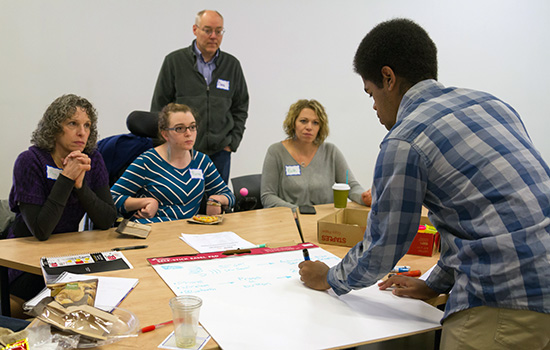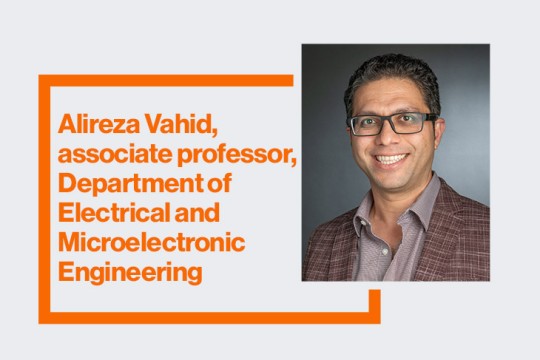IdeaLab teams brainstorm access technology solutions
Seven multidisciplinary student teams presented innovative ideas to industry partners
Ellen O’Neill
Tiree Walker, a first-year industrial design major from Cleveland, presents his innovative idea to his team at the RIT Access Technology IdeaLab. More than 33 RIT students representing multiple disciplines were charged with creating products and services that provide improved access to individuals with physical and developmental disabilities.
Seven teams of students and faculty coaches representing a variety of disciplines spent a weekend in November brainstorming solutions to problems impacting individuals with differing abilities during the RIT Access Technology IdeaLab.
The interactive two-day workshop held in Student Innovation Hall featured hands-on teamwork brainstorming meetings, Q&A sessions and presentations to clients and participating organizations. The student teams were coached by volunteers from RIT faculty and alumni and community organizations.
Following research of user needs, target market characteristics, business requirements and technological possibilities, students created conceptual solutions to the problems.
Dan Harel, adjunct professor of industrial design at RIT and IdeaLab lead, said this year’s IdeaLab was impressive due to the quality of the problems the students were tasked to solve, as well as the participation of parents and their children with physical limitations who shared their stories and challenges with the RIT student teams. He also explained that the Access Tech version of IdeaLab is a key element of the RIT Effective Access Technology initiative, also known as AccessAbility@RIT.
“IdeaLab is designed to link unique problems and challenges with creative and technical problem solvers here at RIT,” said Harel. “The direct interaction and their personal stories made the clients problems even more real and approachable for the student teams.”
Student teams were asked to design:
- A robust, low cost, collapsible, repairable wheelchair solution that can withstand rough terrain in Rwanda and provide disabled children a better chance to attend school.
- An orthotic device for individuals with hemi-dystonia that will enable them to walk properly.
- An assistive golf cart to help disabled individuals regain optimal posture for use with conventional golf clubs.
- A remote-controlled breaking function for disabled cyclists who may have unpredictable reaction times and braking abilities.
- A safe wheelchair lift that stabilizes individuals who rely on walkers and have difficulty entering transport vehicles.
- A manual stander designed for use by individuals with one arm.
- A slide designed for children that will enable them to be safe whether they are in a sitting position facing forward or on their stomachs facing forward.
This was Dan Grinthal’s second time participating in the IdeaLab. Grinthal, a fourth-year industrial design student from Lafayette, N.J., and his team worked on the concept for a wheelchair for Rwandan children that is capable of managing rough terrain. His team demonstrated how a sturdy wheelchair frame could be created with reclaimed, repurposed or surplus material sourced from local waste streams or industrial scrap. The team explained that the 3D model they created could be mounted to any existing seat, even plastic lawn chairs, and converted into a functional wheelchair at a manageable cost.
“I spent a gap year with AmeriCorps, and when I returned to school I was looking for ways to use my industrial design degree to solve problems that really matter,” said Grinthal. “Part of the purpose of IdeaLab is helping us as students to think in just that way. How can my skills be put to best use for the good of the world? It’s easy to get lost in my own projects, deadlines and commitments at this time of the semester, so IdeaLab was a great reboot for my perspective. It got me out of my head and into somebody else’s.”
The weekend featured participation by organizations including the Al Sigl Community of Agencies, SportsNet, Medical Motors, CP Rochester, and University of Rwanda, School of Inclusive and Special Needs, as well as individuals from the Rochester community and was sponsored by the Waldron-Rise Foundation.
IdeaLab is hosted by the Albert J. Simone Center for Student Innovation and Entrepreneurship.















